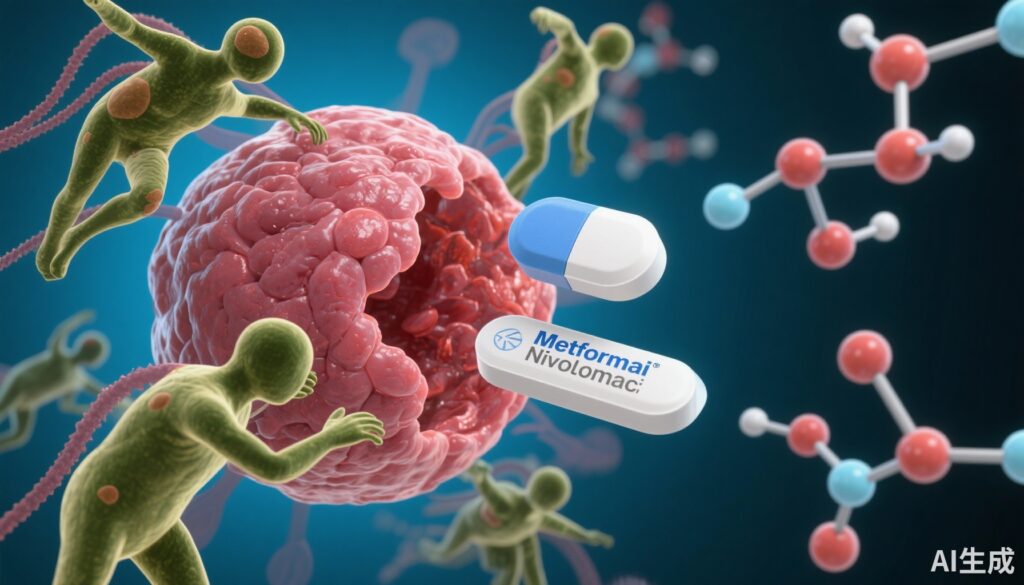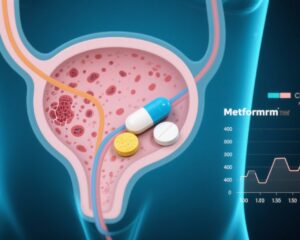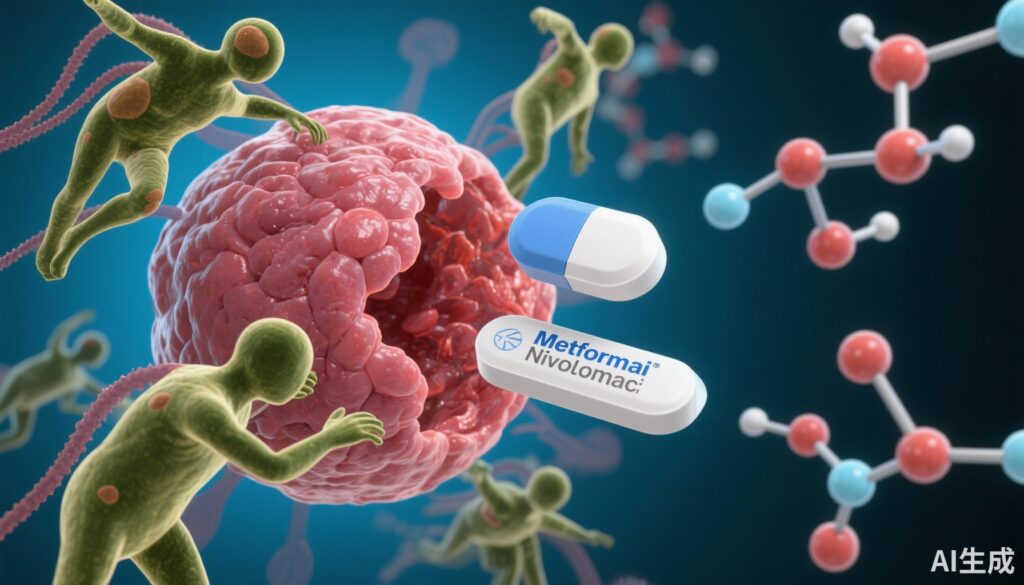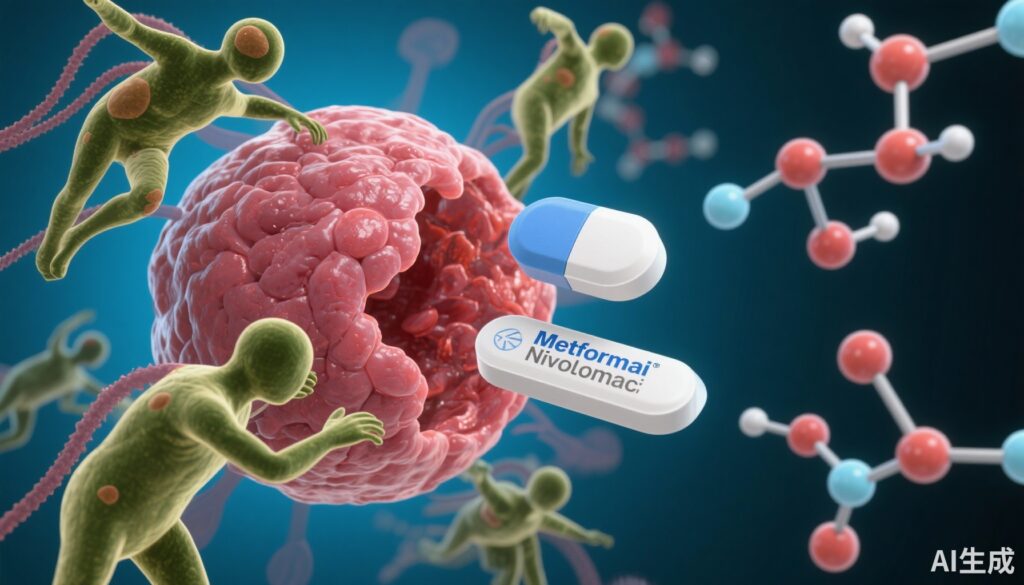Highlight
This phase Ib study assessed the combination of metformin and nivolumab in refractory solid tumors, establishing the maximum tolerated dose (MTD) and safety profile. Metformin up to 2,250 mg/day combined with nivolumab (3 mg/kg biweekly) was well tolerated, with no Grade 5 toxicities. Preliminary clinical responses were observed, including durable disease control in some patients. The combination therapy showed potential to enhance antitumor immunity, warranting further mechanistic and clinical evaluation.
Study Background and Disease Burden
Immune checkpoint inhibitors such as nivolumab, a programmed cell death protein 1 (PD-1) antibody, have revolutionized the treatment of various solid tumors, significantly improving outcomes in some patients. However, many patients with refractory or recurrent solid tumors do not benefit from nivolumab monotherapy due to primary or acquired resistance. Metformin, a widely used antidiabetic drug, has demonstrated immunomodulatory effects and antitumor properties in preclinical models, including enhancing tumor-infiltrating T cell responses and promoting tumor regression.
Preclinical studies from the authors’ group showed that metformin augmented the antitumor efficacy of nivolumab in mouse models by increasing tumor-infiltrating CD8+ T lymphocytes, suggesting a potential synergistic effect. Given the unmet medical need for effective therapies in refractory/recurrent solid tumors, combining metformin with nivolumab offers a promising therapeutic strategy. This phase Ib study was undertaken to evaluate the safety, tolerability, pharmacokinetics, and preliminary efficacy of this combination in humans.
Study Design
The trial was designed in two sequential parts:
- Part 1: Dose-escalation to identify the maximum tolerated dose (MTD) and assess safety and pharmacokinetics in patients with various refractory/recurrent solid tumors. Metformin doses ranged from 750 mg to 2,250 mg per day orally, while nivolumab was administered intravenously at a fixed dose of 3 mg/kg every two weeks. Dose-limiting toxicities (DLTs) were evaluated during the first 4 weeks.
- Part 2: Expansion cohort at the recommended dose determined from part 1 (2,250 mg/day metformin) to primarily evaluate safety in patients with thoracic and pancreatic cancers, which are historically challenging to treat.
Both drugs were administered until disease progression or unacceptable toxicity. Key endpoints included safety profile, determination of MTD, pharmacokinetic parameters, objective response rate (ORR), progression-free survival (PFS), and overall survival (OS).
Key Findings
A total of 41 patients were enrolled: 17 in part 1 and 24 in part 2. The dose escalation did not reach MTD up to the maximum tested dose of 2,250 mg/day of metformin combined with nivolumab 3 mg/kg biweekly. Consequently, the recommended dose for part 2 was set at 2,250 mg/day metformin.
One patient experienced severe adverse events consisting of grade 4 elevation of pancreatic enzymes and concomitant grade 3 lactic acidosis. No Grade 5 (fatal) adverse events occurred during the study, establishing a generally favorable safety profile for the combination.
Regarding efficacy, an objective tumor response was observed in 4 out of 41 patients. Of note, two patients, treated in part 2, remained progression-free for over three years, suggesting potentially durable disease control in a subset of patients.
Survival outcomes were as follows: the one-year progression-free survival rate was 9.8%, reflecting the heavily pretreated refractory population. However, the one-year overall survival rate was encouraging at 56.8%, indicating that some patients may derive meaningful clinical benefit.
Pharmacokinetic analysis indicated no significant drug–drug interaction between metformin and nivolumab, supporting co-administration feasibility.
Expert Commentary
The safety and tolerability profile of metformin combined with nivolumab is consistent with existing data on each agent. Metformin’s common adverse effects, such as gastrointestinal symptoms and risk of lactic acidosis, were rare and manageable in this study. The absence of MTD at the highest metformin dose tested offers flexibility in dosing.
Although the objective response rate was modest, the durable responses in some patients underscore this combination’s potential in augmenting immune-mediated tumor control. The preclinical rationale involving enhanced T cell tumor infiltration aligns with clinical observations, suggesting immune modulation as a mechanism.
Limitations include the small sample size, lack of a comparator arm, and heterogeneous tumor types in part 1. Additionally, the mechanisms underlying the combination’s efficacy require further elucidation, including biomarker studies to identify responders. Future trials may consider biomarker-driven patient selection and combinations with other immunomodulatory agents.
Conclusion
This phase Ib study demonstrates that combining metformin with nivolumab is safe and tolerable in patients with refractory or recurrent solid tumors, with a recommended metformin dose of 2,250 mg daily. Preliminary signals of efficacy, particularly the durable responses observed, provide a rationale for larger, controlled studies to further investigate this combination strategy. Understanding the molecular and immunologic mechanisms will be critical to optimize patient selection and enhance therapeutic benefit.
References
- Kubo T, Kato H, Horiguchi S, Kozuki T, Asagi A, Yoshida M, Udono H, Kiura K, Hotta K. Phase-Ib dose-finding and pharmacokinetic trial of metformin combined with nivolumab for refractory/recurrent solid tumors. Int J Clin Oncol. 2025 Aug;30(8):1537-1544. doi: 10.1007/s10147-025-02786-2. Epub 2025 May 28. PMID: 40434511; PMCID: PMC12296837.
- Hassanein M, Al Jamal J, Kheitawi S. Immunometabolism and immune checkpoint inhibitors: Novel checkpoint inhibitors. J Immunother Cancer. 2022;10(5):e003250.
- Zhou G, Myers R, Li Y, et al. Role of AMP-activated protein kinase in mechanism of metformin action. J Clin Invest. 2001;108(8):1167-1174.




